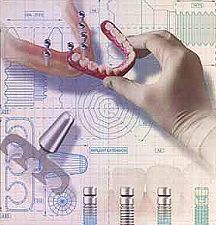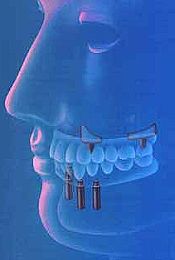Dental Implants
 Not very long ago an attractive middle-aged woman came to see me. She
was very upset as it appeared she was going to lose her few remaining
lower teeth and have to wear a lower denture. She had been told by
friends how difficult it was to comfortably wear a lower denture and
how embarrassing it was when they had to go to the bathroom in the
middle of a meal to remove a painful seed from under the denture or to
add adhesive to keep the denture in place. After some discussion, she
broke down in tears and expressed how distressing it was for her to
lose her teeth. She didn't want to be without teeth but didn't know of
any alternative to dentures.
Not very long ago an attractive middle-aged woman came to see me. She
was very upset as it appeared she was going to lose her few remaining
lower teeth and have to wear a lower denture. She had been told by
friends how difficult it was to comfortably wear a lower denture and
how embarrassing it was when they had to go to the bathroom in the
middle of a meal to remove a painful seed from under the denture or to
add adhesive to keep the denture in place. After some discussion, she
broke down in tears and expressed how distressing it was for her to
lose her teeth. She didn't want to be without teeth but didn't know of
any alternative to dentures.
Fortunately, we were able to offer her an excellent alternative to
the traditional denture. We placed implant supported teeth that were
firmly anchored to her jawbone. She was able to chew with more comfort
and smile with more confidence than she had in many years. This is not
an isolated story but an example of what happens again and again.
 Dental implants are not new, but advanced technology and improved
procedures now make us confident that we can get excellent long-term
results. Many research studies have shown that modern implants, when
carefully placed and restored, can last many years and even a lifetime.
Today dental implants are made of materials such as titanium which has
been used successfully for over 50 years as orthopedic knees and hip
replacements. Dental implants are non-allergenic, and very compatible
with body tissue. An improved knowledge of how to place implants
without injuring tissue and how to increase the stability of the
implants in the jaw bones has resulted in very gratifying success for
hundreds of thousands of patients.
Dental implants are not new, but advanced technology and improved
procedures now make us confident that we can get excellent long-term
results. Many research studies have shown that modern implants, when
carefully placed and restored, can last many years and even a lifetime.
Today dental implants are made of materials such as titanium which has
been used successfully for over 50 years as orthopedic knees and hip
replacements. Dental implants are non-allergenic, and very compatible
with body tissue. An improved knowledge of how to place implants
without injuring tissue and how to increase the stability of the
implants in the jaw bones has resulted in very gratifying success for
hundreds of thousands of patients.
How can Implants be used?
Implants can be used to replace dentures, bridges or missing
individual teeth. Also, implants can be used to stabilize or replace
teeth loosened by periodontal disease or accidents. They can even be
used as anchors to help move and straighten other teeth with
orthodontics. As you can see, dental implants are quite versatile and
helpful in many treatment conditions.
Who can have Implants?
While dental implants are not appropriate treatment for every
patient, it is the rare person who cannot receive an implant. There are
a variety of sizes, shapes and types of implants and no single type is
going to be best for everyone. Each individual has unique oral anatomy,
so we use a variety of implant designs depending on the needs of the
patient and their particular dental condition.
 What are the benefits of Dental Implants?
What are the benefits of Dental Implants?
The most obvious benefit is an increased ability to chew and
function with implant-supported teeth. In fact, it has been shown that
while people with dentures can only chew food with about 20% of the
force of their natural teeth, people with implants can chew with 85% to
95% of the force of their natural teeth. But there can be many other
benefits. One common problem that denture wearers face is the lack of
stability of dentures, particularly lower dentures, as they are
balanced on the jawbone between the muscles of the cheek, lips and
tongue. The insecurity resulting from loose dentures can be eliminated
by using implants to "anchor" dentures or by making implant-supported
teeth. For some people it is the discomfort or bulkiness of removable
dental appliances that is the major concern. Implants can eliminate
these problems also. The loss of teeth and the supporting bone can
cause significant changes in facial features.
Anyone with dentures knows how important the teeth, gums and
jawbone are as support for the lips, cheeks and lower face. Loss of
these important structures gives an appearance of premature aging and
for many people causes emotional distress and a loss of self-esteem.
Implant-supported teeth and dentures can slow down this aging process
and help improve self esteem and the often-felt loss of intimacy. So,
while functional benefits are the most obvious, cosmetic and emotional
benefits are for many people as important as, or more important than,
improved chewing.
How successful are Implants?
While there are risks and concerns with any dental procedure,
results of implant treatment are quite predictable today. Each patient
must be evaluated individually by a dentist with experience in
implantology. The discipline of implantology is demanding, but
extremely rewarding. I have elected to concentrate my practice on
implantology because of the tremendous gratification of seeing so many
of my patients so pleased with their implants. Implants are here to
stay and will continue to improve the quality of life and help restore
the oral health of millions of people.
Dental Implant FAQs
Click here to view our Dental Implant Frequently Asked Questions
Dental Implants Additional Information
Click Here for Dental Implant Post-Operative Instructions
Click Here for additional information about Dental Implants
|
|

